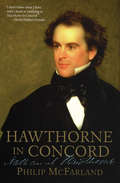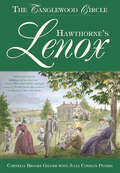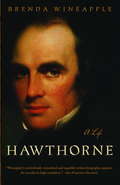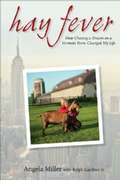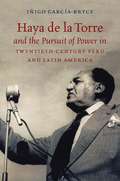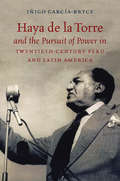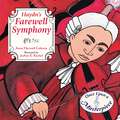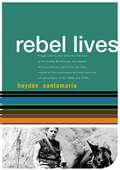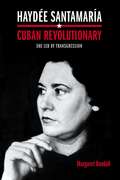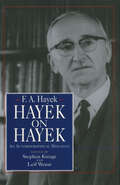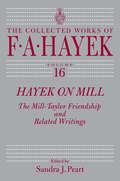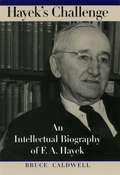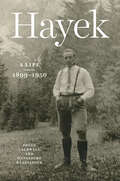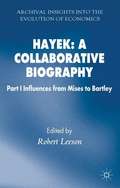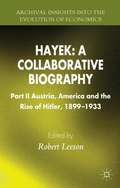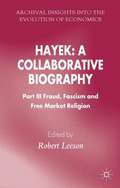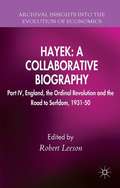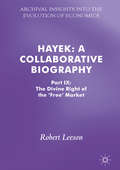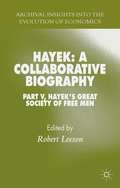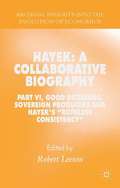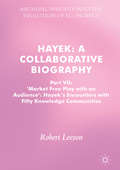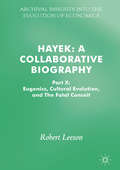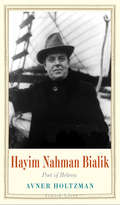- Table View
- List View
Hawthorne in Concord: Nathaniel Hawthorne
by Philip McFarlandOn his wedding day in 1842, Nathaniel Hawthorne escorted his new wife, Sophia, to their first home, the Old Manse in Concord, Massachusetts. There, enriched by friendships with Thoreau and Emerson, he enjoyed an idyllic time. But three years later, unable to make enough money from his writing, he returned ingloriously, with his wife and infant daughter, to live in his mother's home in Salem.In 1853 Hawthorne moved back to Concord, now the renowned author of The Scarlet Letter and The House of the Seven Gables. Eager to resume writing fiction at the scene of his earlier happiness, he assembled a biography of his college friend Franklin Pierce, who was running for president. When Pierce won the election, Hawthorne is appointed the lucrative post of consul in Liverpool.Coming home from Europe in 1860, Hawthorne settled down in Concord once more. He tried to take up writing one last time, but deteriorating health finds him withdrawing into private life. In Hawthorne in Concord, acclaimed historian Philip McFarland paints a revealing portrait of this well-loved American author during three distinct periods of his life, spent in the bucolic village of Concord, Massachusetts.
Hawthorne's Lenox: The Tanglewood Circle (The Tanglewood Circle)
by Julia Conklin Peters Cornelia Brooke GilderAn account of the famous American author’s visit to a New England retreat. “Anyone who loves the Berkshires will love this book.” —Debby Applegate, Pulitzer Prize-winning authorWhat drew Nathaniel Hawthorne to a remote village deep in the Berkshire Hills of Western Massachusetts in 1850? Slip into the fascinating social scene he encountered in the drawing rooms and on the croquet lawns of Lenox’s country retreats. Here, under the benevolent spell of the Sedgwick family, the separate worlds of high-minded Bostonians and high-powered New Yorkers were stitched together by conversation, recreation and even marriage. Nurturing the lively exchange of ideas on everything from art to abolition, Lenox’s cottages played host to a community that enlightened a nation. Luminaries such as Caroline Sturgis Tappan and Oliver Wendell Holmes resume their vibrant lives through the rare photographs and engaging sketches of everyday life in Hawthorne’s Lenox: The Tanglewood Circle, which also includes a delightful retrospective visit from Henry James and Edith Wharton.
Hawthorne: A Life
by Brenda WineappleHandsome, reserved, almost frighteningly aloof until he was approached, then playful, cordial, Nathaniel Hawthorne was as mercurial and double-edged as his writing. "Deep as Dante," Herman Melville said. Hawthorne himself declared that he was not "one of those supremely hospitable people who serve up their own hearts, delicately fried, with brain sauce, as a tidbit" for the public. Yet those who knew him best often took the opposite position. "He always puts himself in his books," said his sister-in-law Mary Mann, "he cannot help it." His life, like his work, was extraordinary, a play of light and shadow.In this major new biography of Hawthorne, the first in more than a decade, Brenda Wineapple, acclaimed biographer of Janet Flanner and Gertrude and Leo Stein ("Luminous"-Richard Howard), brings him brilliantly alive: an exquisite writer who shoveled dung in an attempt to found a new utopia at Brook Farm and then excoriated the community (or his attraction to it) in caustic satire; the confidant of Franklin Pierce, fourteenth president of the United States and arguably one of its worst; friend to Emerson and Thoreau and Melville who, unlike them, made fun of Abraham Lincoln and who, also unlike them, wrote compellingly of women, deeply identifying with them-he was the first major American writer to create erotic female characters. Those vibrant, independent women continue to haunt the imagination, although Hawthorne often punishes, humiliates, or kills them, as if exorcising that which enthralls. Here is the man rooted in Salem, Massachusetts, of an old pre-Revolutionary family, reared partly in the wilds of western Maine, then schooled along with Longfellow at Bowdoin College. Here are his idyllic marriage to the youngest and prettiest of the Peabody sisters and his longtime friendships, including with Margaret Fuller, the notorious feminist writer and intellectual.Here too is Hawthorne at the end of his days, revered as a genius, but considered as well to be an embarrassing puzzle by the Boston intelligentsia, isolated by fiercely held political loyalties that placed him against the Civil War and the currents of his time.Brenda Wineapple navigates the high tides and chill undercurrents of Hawthorne's fascinating life and work with clarity, nuance, and insight. The novels and tales, the incidental writings, travel notes and children's books, letters and diaries reverberate in this biography, which both charts and protects the dark unknowable core that is quintessentially Hawthorne. In him, the quest of his generation for an authentically American voice bears disquieting fruit.From the Hardcover edition.
Hay Fever
by Angela Miller Ralph Gardner Jr.The compelling, funny story of a high-powered professional's life-changing journey from Manhattan big cheese to Vermont goat cheesemaker In the tradition of food memoirs like Under the Tuscan Sun and A Year in Provence, Hay Fever tells the story of New York City literary agent Angela Miller and how looking for tranquility on a Vermont farm turned into an eye-opening, life-changing experience. Seeking solace in the midst of midlife strife brought on by family stress and a high-stakes career, Miller and her husband bought a farm in rural Vermont. But what started as a part time "project" turned into a full-blown obsession and culinary passion that not only changed their lives forever, but also resulted in some of America's best cheeses, prestigious awards, and media fame. Today, cheeses from Consider Bardwell Farm are featured at some of the country's best restaurants, including Jean Georges, Daniel, and The French Laundry. * For cheese lovers and would-be farmers, it's an inside look at the everyday operation of a successful and growing dairy farm * Author Angela Miller, literary agent in New York City, has won prestigious awards for her cheeses and has been featured in such publications as the Boston Globe, the New York Times, Travel & Leisure, and Martha Stewart Living * More than a memoir-the book includes recipes from the author and top food personalities like Mark Bittman and Jean-Georges Vongerichten Hay Fever is an inspiring and entertaining memoir that will whet the appetite of food lovers and would-be farmers from coast to coast.
Haya de la Torre and the Pursuit of Power in Twentieth-Century Peru and Latin America
by Iñigo García-BryceLike Fidel Castro and Che Guevara, Peruvian Victor Raul Haya de la Torre (1895-1979) was one of Latin America's key revolutionary leaders, well known across national boundaries. Inigo Garcia-Bryce's biography of Haya chronicles his dramatic political odyssey as founder of the highly influential American Popular Revolutionary Alliance (APRA), as a political theorist whose philosophy shifted gradually from Marxism to democracy, and as a seasoned opposition figure repeatedly jailed and exiled by his own government. Garcia-Bryce spotlights Haya's devotion to forging populism as a political style applicable on both the left and the right, and to his vision of a pan-Latin American political movement. <P><P>A great orator who addressed gatherings of thousands of Peruvians, Haya fired up the Aprismo movement, seeking to develop "Indo-America" by promoting the rights of Indigenous peoples as well as laborers and women. Steering his party toward the center of the political spectrum through most of the Cold War, Haya was elected president in 1962--but he was blocked from assuming office by the military, which played on his rumored homosexuality. Even so, Haya's insistence that political parties must cultivate Indigenous roots and oppose violence as a means of achieving political power has left a powerful legacy across Latin America.
Haya de la Torre and the Pursuit of Power in Twentieth-Century Peru and Latin America
by Iñigo García-BryceLike Fidel Castro and Che Guevara, Peruvian Victor Raul Haya de la Torre (1895–1979) was one of Latin America's key revolutionary leaders, well known across national boundaries. Inigo Garcia-Bryce's biography of Haya chronicles his dramatic political odyssey as founder of the highly influential American Popular Revolutionary Alliance (APRA), as a political theorist whose philosophy shifted gradually from Marxism to democracy, and as a seasoned opposition figure repeatedly jailed and exiled by his own government. Garcia-Bryce spotlights Haya's devotion to forging populism as a political style applicable on both the left and the right, and to his vision of a pan-Latin American political movement. A great orator who addressed gatherings of thousands of Peruvians, Haya fired up the Aprismo movement, seeking to develop "Indo-America" by promoting the rights of Indigenous peoples as well as laborers and women. Steering his party toward the center of the political spectrum through most of the Cold War, Haya was elected president in 1962—but he was blocked from assuming office by the military, which played on his rumored homosexuality. Even so, Haya's insistence that political parties must cultivate Indigenous roots and oppose violence as a means of achieving political power has left a powerful legacy across Latin America.
Haydn's Farewell Symphony (Once Upon a Masterpiece #1)
by Anna Harwell CelenzaAnna Harwell Celenza's engaging fictionalized telling of the story behind Franz Joseph Haydn's famous symphony is a perfect introduction to classical music and its power. THE FAREWELL SYMPHONY brings to life a long summer spent at Esterháza, the summer palace of Prince Nicholas of Esterházy.The blustering, bellowing prince entertained hundreds of guests at his rural retreat and demanded music for every occasion. As the months passed, Haydn was kept very busy writing and performing music for parties, balls, dinners, and even walks in the gardens. His orchestra members became homesick and missed their families. The anger, frustration, and longing of the musicians is expressed beautifully in the symphony born of the clever mind of Joseph Haydn who used it to convince Prince Nicholas that it was time to go home.Wonderfully expressive illustrations by JoAnn E. Kitchel capture all the comedy and pathos of this unique symphony. Beautifully interpretive motifs and borders convey the setting and emotion of the story mirroring the structure of the symphony with the repetitive use of sets of four. Making classical music and history come alive with color and character, THE FAREWELL SYMPHONY ensures a place for the arts in the hearts and minds of children.
Haydée Santamaría
by Betsy MacleanHaydée first achieved notoriety by being one of the two women who participated in the armed attack that sparked the Cuban Revolution. Later, as director of the world renowned literary institution, Casa de las Americas, she embraced culture as a tool for social change and provided refuge for exiled Latin American artists and intellectuals. Included are reflections by Alicia Alonso, Mario Benedetti, Ariel Dorfman, Melba Hernandez, Roberto Fernandez Retamar and Silvio Rodriguez.
Haydée Santamaría, Cuban Revolutionary: She Led by Transgression
by Margaret RandallTaking part in the Cuban Revolution's first armed action in 1953, enduring the torture and killings of her brother and fiancé, assuming a leadership role in the underground movement, and smuggling weapons into Cuba, Haydée Santamaría was the only woman to participate in every phase of the Revolution. Virtually unknown outside of Cuba, Santamaría was a trusted member of Fidel Castro's inner circle and friend of Che Guevara. Following the Revolution's victory Santamaría founded and ran the cultural and arts institution Casa de las Americas, which attracted cutting-edge artists, exposed Cubans to some of the world's greatest creative minds, and protected queer, black, and feminist artists from state repression. Santamaría's suicide in 1980 caused confusion and discomfort throughout Cuba; despite her commitment to the Revolution, communist orthodoxy's disapproval of suicide prevented the Cuban leadership from mourning and celebrating her in the Plaza of the Revolution. In this impressionistic portrait of her friend Haydée Santamaría, Margaret Randall shows how one woman can help change the course of history.
Hayek on Hayek: An Autobiographical Dialogue ( The Collected Works of F. A. Hayek)
by F. A. HayekThe crumbling of the Berlin Wall, the fall of the iron curtain, and the Reagan and Thatcher "revolutions" all owe a tremendous debt to F. A. Hayek. Economist, social and political theorist, and intellectual historian, Hayek passionately championed individual liberty and condemned the dangers of state control. Now Hayek at last tells the story of his long and controversial career, during which his fortunes rose, fell, and finally rose again. Through a complete collection of previously unpublished autobiographical sketches and a wide selection of interviews, Hayek on Hayek provides the first detailed chronology of Hayek's early life and education, his intellectual progress, and the academic and public reception of his ideas. His discussions range from economic methodology and the question of religious faith to the atmosphere of post-World War I Vienna and the British character. Born in 1899 into a Viennese family of academics and civil servants, Hayek was educated at the University of Vienna, fought in the Great War, and later moved to London, where, as he watched liberty vanish under fascism and communism across Europe, he wrote The Road to Serfdom. Although this book attracted great public attention, Hayek was ignored by other economists for thirty years after World War II, when European social democracies boomed and Keynesianism became the dominant intellectual force. However, the award of the Nobel Prize in economics for 1974 signaled a reversal in Hayek's fortunes, and before his death in 1992 he saw his life's work vindicated in the collapse of the planned economies of Eastern Europe.Hayek on Hayek is as close to an autobiography of Hayek as we will ever have. In his own eloquent words, Hayek reveals the remarkable life of a revolutionary thinker in revolutionary times. "One of the great thinkers of our age who explored the promise and contours of liberty....[Hayek] revolutionized the world's intellectual and political life"—President George Bush, on awarding F. A. Hayek the Medal of Freedom F. A. Hayek, recipient of the Medal of Freedom 1991 and the Nobel Memorial Prize in Economics in 1974, was a pioneer in monetary theory and the principal proponent of the libertarian philosophy. Hayek is the author of numerous books in economics, as well as books in political philosophy and psychology.
Hayek on Mill: The Mill-Taylor Friendship and Related Writings (The Collected Works of F. A. Hayek #16)
by Friedrich A. Hayek Sandra J. Peart edited by Sandra J. PeartBest known for reviving the tradition of classical liberalism, F. A. Hayek was also a prominent scholar of the philosopher John Stuart Mill. One of his greatest undertakings was a collection of Mill's extensive correspondence with his longstanding friend and later companion and wife, Harriet Taylor-Mill. Hayek first published the Mill-Taylor correspondence in 1951, and his edition soon became required reading for any study of the nineteenth-century foundations of liberalism. This latest addition to the University of Chicago Press's Collected Works of F. A. Hayek series showcases the fascinating intersections between two of the most prominent thinkers from two successive centuries. Hayek situates Mill within the complex social and intellectual milieu of nineteenth-century Europe-as well as within twentieth-century debates on socialism and planning-and uncovers the influence of Taylor-Mill on Mill's political economy. The volume features the Mill-Taylor correspondence and brings together for the first time Hayek's related writings, which were widely credited with beginning a new era of Mill scholarship.
Hayek's Challenge: An Intellectual Biography of F.A. Hayek
by Bruce CaldwellFriedrich A. Hayek is regarded as one of the preeminent economic theorists of the twentieth century, as much for his work outside of economics as for his work within it. During a career spanning several decades, he made contributions in fields as diverse as psychology, political philosophy, the history of ideas, and the methodology of the social sciences. Bruce Caldwell—editor of The Collected Works of F. A. Hayek—understands Hayek's thought like few others, and with this book he offers us the first full intellectual biography of this pivotal social theorist. Caldwell begins by providing the necessary background for understanding Hayek's thought, tracing the emergence, in fin-de-siècle Vienna, of the Austrian school of economics—a distinctive analysis forged in the midst of contending schools of thought. In the second part of the book, Caldwell follows the path by which Hayek, beginning from the standard Austrian assumptions, gradually developed his unique perspective on not only economics but a broad range of social phenomena. In the third part, Caldwell offers both an assessment of Hayek's arguments and, in an epilogue, an insightful estimation of how Hayek's insights can help us to clarify and reexamine changes in the field of economics during the twentieth century. As Hayek's ideas matured, he became increasingly critical of developments within mainstream economics: his works grew increasingly contrarian and evolved in striking—and sometimes seemingly contradictory—ways. Caldwell is ideally suited to explain the complex evolution of Hayek's thought, and his analysis here is nothing short of brilliant, impressively situating Hayek in a broader intellectual context, unpacking the often difficult turns in his thinking, and showing how his economic ideas came to inform his ideas on the other social sciences.Hayek's Challenge will be received as one of the most important works published on this thinker in recent decades.
Hayek: A Life, 1899–1950 (The\collected Works Of F. A. Hayek Ser.)
by Bruce Caldwell Hansjoerg KlausingerA 2022 Economist Best Book of the Year. The definitive account of the distinguished economist’s formative years. Few twentieth-century figures have been lionized and vilified in such equal measure as Friedrich Hayek—economist, social theorist, leader of the Austrian school of economics, and champion of classical liberalism. Hayek’s erudite arguments in support of individualism and the market economy have attracted a devout following, including many at the levers of power in business and government. Critics, meanwhile, cast Hayek as the intellectual forefather of “neoliberalism” and of all the evils they associate with that pernicious doctrine. In Hayek: A Life, historians of economics Bruce Caldwell and Hansjörg Klausinger draw on never-before-seen archival and family material to produce an authoritative account of the influential economist’s first five decades. This includes portrayals of his early career in Vienna; his relationships in London and Cambridge; his family disputes; and definitive accounts of the creation of The Road to Serfdom and of the founding meeting of the Mont Pèlerin Society. A landmark work of history and biography, Hayek: A Life is a major contribution both to our cultural accounting of a towering figure and to intellectual history itself.
Hayek: Part I Influences from Mises to Bartley (Archival Insights Into the Evolution of Economics)
by Robert LeesonThis is the first collaborative biography of Hayek. Some of the world's most distinguished scholars will integrate the archival evidence with Hayek's published writings to illuminate the process by which Hayek changed the direction of world history.
Hayek: Part II Austria, America and the Rise of Hitler, 1899- 1933 (Archival Insights Into the Evolution of Economics)
by Robert LeesonA group of leading scholars from around the world use archival material alongside Hayek's published work to bring a new perspective on the life and times of one the 20th Century's most influential economists. This much awaited second volume details the life of Hayek from 1899 to1933 covering Hayek's time in Austria and the USA.
Hayek: Part III Fraud, Fascism and Free Market Religion (Archival Insights Into the Evolution of Economics)
by Robert LeesonIn 1984, F. A. Hayek, the co-leader of the Austrian free market neo-classical school, embraced the transparently fraudulent assertion made by Donald McCormick, aka Richard Deacon, in The British Connection (1979) which accused A. C. Pigou, the co-leader of the Cambridge market failure neo-classical school, of being a Soviet spy. Over lunch at the Reform Club with 'Deacon' McCormick, the former Sunday Times Foreign Manager, Hayek authenticated the fraudulent signature contained in a 1905 diary the essence of the case against Pigou. In this third volume of Hayek: A Collaborative Biography, a distinguished collection of academics and specialists examine 'Deacon' McCormick's fraudulent career: summarizing the large volume of incriminating evidence that was available to Hayek in 1984. Hayek's 1931 unsubstantiated assertion about having predicted the Great Depression was obviously matched by other equally unreliable assertions. That Hayek's assertions have been uncritically repeated by his disciples illuminates dynamics of that school. Austrian School economists who promote financial sector deregulation and climate change denial appear to resemble a free market religion rather than the scientific communities examined in other volumes in this series. "
Hayek: Part IV, England, the Ordinal Revolution and the Road to Serfdom, 1931- 50 (Archival Insights Into the Evolution of Economics)
by Robert LeesonThe study encompasses historical, social, political and economic viewpoints in examining Hayek's life and the history of economic thought. In the early 1930s, Hayek's business cycle work was apparently defeated by John Maynard Keynes and Piero Sraffa. However, Hayek had three successes. The Ordinal revolution, which undermined the foundations of welfare economics, was successfully transplanted from pre-war Austria and Lausanne to inter-war Britain. The Road to Serfdom (1944) attributed blame for Hitler not on those who funded him (the business sector) but on those who opposed him (socialists). In 1947, Hayek also launched the highly influential Mont Pelerin Society. Hayek had to diplomatically navigate around the other branch of the Austrian School (as represented by Ludwig Mises) whilst maintaining support from members of the nascent Chicago School. As an atheist Hayek had to compromise: the Society would not be named after two Roman Catholic aristocrats (The Acton de Tocqueville Society), but what later became known as the 'religious right' was, nevertheless, accommodated.
Hayek: Part IX: The Divine Right of the 'Free' Market (Archival Insights into the Evolution of Economics)
by Robert LeesonIn 1984, F. A. Hayek, the co-leader of the Austrian free market neo-classical school, embraced the transparently fraudulent assertion made by Donald McCormick, aka Richard Deacon, in The British Connection (1979) which accused A. C. Pigou, the co-leader of the Cambridge market failure neo-classical school, of being a Soviet spy. Over lunch at the Reform Club with 'Deacon' McCormick, the former Sunday Times Foreign Manager, Hayek authenticated the fraudulent signature contained in a 1905 diary the essence of the case against Pigou. In this third volume of Hayek: A Collaborative Biography, a distinguished collection of academics and specialists examine 'Deacon' McCormick's fraudulent career: summarizing the large volume of incriminating evidence that was available to Hayek in 1984. Hayek's 1931 unsubstantiated assertion about having predicted the Great Depression was obviously matched by other equally unreliable assertions. That Hayek's assertions have been uncritically repeated by his disciples illuminates dynamics of that school. Austrian School economists who promote financial sector deregulation and climate change denial appear to resemble a free market religion rather than the scientific communities examined in other volumes in this series. "
Hayek: Part V, Hayek's Great Society of Free Men (Archival Insights Into the Evolution of Economics)
by Robert LeesonThis fifth biographical volume examines the hypothesis that Hayek's promotion of the Great Society of Free Men was consistent with his behavioural postulate: amoral self-interest. His Constitution of Liberty promoted those with inter-generational entitlements as the true defenders of 'civilisation' and 'property' - an Austrian School of Economics vision of society dominated by the wealthy. According to Hayek, labour unions were enemies of his 'spontaneous' order: yet unions evolved spontaneously. This archival series also provides an opportunity for reflection, correction and elaboration: two chapters responses to material contained in Part I of Hayek: A Collaborative Biography. <P><P>F.A. von Hayek (1899-1992), who's Nobel Prize for Economic Sciences appears to have been awarded, in part, for a job-interview assertion for which – after eight decades – no evidence has emerged, was famous for promoting the Austrian version of classical liberalism.
Hayek: Part VI, Good Dictators, Sovereign Producers and Hayek's "Ruthless Consistency" (Archival Insights Into The Evolution of Economics)
by Robert LeesonIn this sixth volume contributors examine Hayek's neoliberal economics and politics in the 20th century, and the demise of the socialist system. Taking a closer look at Hayek's time in Australia, and his time spent travelling in the east.
Hayek: Part VII, 'Market Free Play with an Audience': Hayek's Encounters with Fifty Knowledge Communities (Archival Insights into the Evolution of Economics)
by Robert LeesonThis book is the seventh volume in this series which explores the life of Nobel Price-winning economist F.A. Hayek (1899-1992). The volume uses archival material, juxtaposed with Hayek’s published work to challenge the existing perceptions of his life and thought. It examines the methods by which Hayek interacted with – and schemed against – the knowledge communities that he encountered during his very long life. Chapters explore the ‘rules of engagement’ that Hayek employed when interacting with fifth leading knowledge communities, including the Nobel Prize selection committee who were led to believe his claim about having predicted the Great Depression. It also explores his interactions with William Beveridge, the founder of the modern British Welfare State, A. C. Pigou, the founder of the market school, J. M. Keynes, Sir Arthur Lewis, and Abba Lerner.
Hayek: Part X: Eugenics, Cultural Evolution, and The Fatal Conceit (Archival Insights into the Evolution of Economics)
by Robert LeesonThis tenth part of Robert Leeson's collaborative biography of Friedrich August von Hayek explores Hayek’s thought on the free market and democracy. Using an unparalleled array of archival materials, Leeson reconstructs Hayek’s thinking as the notorious economist and his acolytes set about reshaping the post-war economic order. Darker areas of Hayek’s thought are also explored, including the influence of eugenics on his thought and his support for radical right-wing dictatorships in South America. <P><P> Leeson concludes this volume with a collection of chapters written by eminent scholars of Hayek. These chapters cover subjects as diverse as Hayek’s influence on scholars of Darwinian evolution, his views on psychology, and cultural evolution.
Hayim Nahman Bialik: Poet of Hebrew (Jewish Lives)
by Prof. Avner HoltzmanA moving inquiry into the dramatic life, epic success, and ultimate tragedy of the great Hebrew poet By the time he was twenty-eight, Hayim Nahman Bialik was already considered the National Hebrew Poet. He had only published a single collection, but his deeply personal poetry established a profound link between the secular and the traditional that would become paramount to a national Jewish identity in the twentieth century. When he died unexpectedly in 1934, the outpouring of grief was unprecedented, confirming him as a father figure for the Zionist movement in Palestine, and around the world. Using extensive research and elegant readings of Bialik's poems, Avner Holtzman investigates the poet's dramatic life, complex personality, beloved verse, and continued popularity. This clear-eyed and thorough biography explores how Bialik overcame intense personal struggles to become a charismatic literary leader at the core of modern Hebrew culture.
Hayley Okines - A Life to Celebrate
by Hayley OkinesHayley Okines was just like any other teenager: she loved clothes, shopping, and boy bands, and hated getting up in the morning. But she had progeria, which meant she aged eight times faster than normal, giving her the body of a 126-year-old. Her positive attitude and infectious smile charmed millions of people through her Extraordinary People TV documentaries. At the age of seventeen, in April 2015, Hayley tragically lost her battle to be the longest survivor of progeria, succumbing to pneumonia in the arms of her mother. This book tells Hayley's story in her own words, continuing from the bestselling Old Before My Time. She reflects on the pains and perks of growing up with progeria - from the heartbreak of being told she will never walk again to the delight of passing her exams and starting college. Hayley considers mood swings, marriage, music, and what it's like to be 'famous' and is heartbreakingly positive about a future that wasn't to be.
